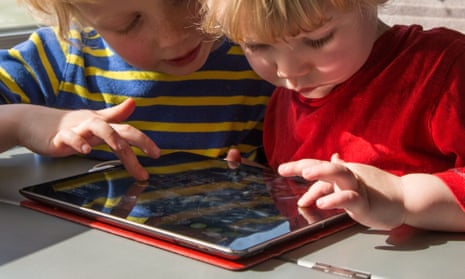A third of pre-school children in the UK have their own iPad or a similar tablet that they use for an average of one hour and 19 minutes every weekday, often on their own without a parent or guardian, according to research.
The study found that in households that have tablets, 31% of children aged five and under have their own tablet; among even the youngest children ownership is widespread with a quarter of those under three having a tablet of their own.
Researchers are now calling for further support and guidance for parents, and are proposing “family digital literacy programmes” in early years settings and schools, to help parents support their children’s use of apps and tablets.
Researchers found that of those aged between three and five, 37% have their own tablet. They are most likely to use them from 4-6pm during the week, but use is more evenly spread at the weekend when children play on their tablets for an extra four minutes each day on average.
Many children are allowed to play independently, with more than a third (35%) of pre-schoolers using their tablet on their own; they’re most likely to be left on their own at the beginning and end of the day, but 57% of pre-schoolers play on the tablet with a parent or guardian.
Researchers found that while some apps could help children with play and creativity, others apps were less helpful, in particular those aimed at older children, like the highly popular Candy Crush Saga and Angry Birds. They urged parents to choose carefully, use only age-appropriate apps, and find time to play with their children and share their experience while they are on their tablets.
The research was based on a survey of 2,000 parents of children aged up to five where there was at least one tablet in the household. Lead researcher Jackie Marsh, of Sheffield University, said: “The study showed that the use of apps on tablets by pre-schoolers can be very productive and foster a wide range of play and creativity.
“However, apps need to be chosen carefully by parents for this age group. Apps that contain adverts and pop-ups for in-app purchases can limit children’s play. In addition, whilst children of this age want to play some of the same games that their older siblings or parents play, these are not age-appropriate and do not offer a great deal of value for pre-schoolers.
“Parents should look for apps produced by broadcasters or companies that know a great deal about this age group.”
Fellow researcher Lydia Plowman, from Edinburgh University, added: “It may seem surprising that in homes with a tablet, nearly a third of under-fives have their own device. But when parents upgrade their tablet many pass on their older model to their children.
“Budget models are also popular gifts, as parents don’t have to worry so much about breakages. While there are benefits to children becoming independent users, it’s also important that parents are able to find time to share the experience of interacting with apps.”
The study is published as questions are being raised about the effectiveness of new technology in classroom settings. Last month, a global study by the Organisation for Economic Co-operation and Development (OECD) found that investing heavily in computers in the classroom did not improve pupils’ performance, with frequent use of computers associated with lower results.
According to Tuesday’s research, pre-school children use their tablets to watch television, either on catch-up or streaming services; they watch films, play games, listen to music, draw and paint, look after pets, dress up avatars and engage in role-play.
They appear to be quite skilful with their iPads. More than half can swipe the screen, drag items, open and exit apps and tap the screen to operate commands.
Six per cent of children have seen content that has made them feel uncomfortable; 9% have been exposed to content that made their parents feel uncomfortable and one in 10 has made an accidental in-app purchase. The research also found that parents don’t always use safety settings and are unaware of how children can get online through the use of some apps.
The project, funded by the Economic and Social Research Council, is a collaboration between Sheffield and Edinburgh universities and the pre-school children’s TV channel CBeebies, among others, and has led to a range of publications aimed at parents and early years educators to provide guidance on apps for pre-schoolers.
It recommended that more pre-school children should have access to tablets in early years settings to encourage creative use of apps, and better training for early years professionals in how to choose suitable apps and use tablets effectively.
Davina Ludlow, the director of daynurseries.co.uk, an online guide to day nurseries and nursery schools, said: “Children are increasingly exposed to an overwhelming amount of technology at an early age. Whilst we understand that the use of some apps may have educational benefits, we are concerned that technology is increasingly displacing the traditional methods of learning and play activities and encouraging sedentary behaviour.
“At that age especially, children deserve to develop the all-important social skills that are gained from social interaction. A poll we conducted last year showed the majority of people clearly feel the same. They want to see early education and childhood play protected from the fast-paced world of technology.”
Children’s top 10 favourite apps
1 YouTube
2 CBeebies (Playtime and Storytime)
3 Angry Birds
4 Talking Tom
5 Peppa’s Paintbox
6 Temple Run
7 Minecraft
8 Disney
9 Candy Crush Saga
10 Toca Boca
